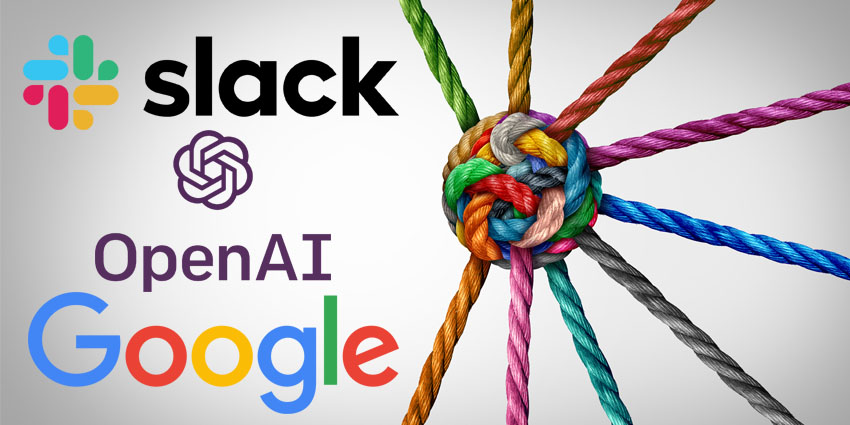OpenAI is reportedly testing ChatGPT connectors for Slack and Google Drive to turbocharge AI-powered collaboration and productivity.
As first reported by TechCrunch, which cites a document it has viewed, OpenAI is preparing to launch beta testing for a new feature called ChatGPT Connectors. This feature will enable ChatGPT Team subscribers to integrate their workspace Google Drive and Slack accounts with ChatGPT, allowing the AI to provide responses based on files, presentations, spreadsheets, and Slack conversations within those connected accounts.
The document allegedly reads:
This will allow employees using ChatGPT to easily make use of internal information similar to how they can use world knowledge via web search.”
The document also indicates that OpenAI intends to expand ChatGPT Connectors to additional platforms, such as Microsoft SharePoint and Box.
ChatGPT Connectors, reportedly launching soon in beta for select ChatGPT Team users, is powered by a version of OpenAI’s GPT-4o model tailored to refine responses using “internal [company] knowledge,” according to the document seen by TechCrunch. All members of a participating ChatGPT Team workspace will have access to the model through OpenAI’s ChatGPT apps.
The custom GPT-4o model is designed to search and interpret internal company information relevant to user queries. According to the document, to enable this capability, OpenAI generates a searchable index by syncing an encrypted copy of company files and conversations to ChatGPT’s servers.
“Additional related information which [sic] the model did not directly make use of is accessible by clicking on the sources button at the bottom of each response,” the document said. “When appropriate, the model will directly respond with a list of relevant results.”
OpenAI stresses that ChatGPT Connectors respect Slack and Google Drive permissions, ensuring employees can’t access content they lack permission for. Admins control which files and channels are synced, though responses may vary based on access. The tool can’t analyse images, retrieve Slack DMs, or process bot messages. It reportedly can only “read” data in Sheets and Excel.
Companies joining the beta must provide 100 documents or conversations, which OpenAI won’t train on but may use for synthetic data generation. However, the company states that no synced Google Drive or Slack data will be used for model training.
OpenAI didn’t respond to TechCrunch’s requests for comment.
What Could This Mean For Slack, ChatGPT and Google Drive Customers?
OpenAI’s introduction of ChatGPT Connectors for Slack and Google Drive, with Microsoft SharePoint and Box on the horizon, signals a potential shift in how enterprise knowledge is accessed and utilised. These depths of integrations offer compelling opportunities and considerations.
The primary value proposition in play is democratised knowledge access. By connecting ChatGPT to workplace collaboration tools, organisations can reduce information silos and democratise access to institutional knowledge. Employees can query across previously disconnected data sources, potentially reducing time spent searching for information by 30-40 percent.
For IT leaders, this possibly creates a “single pane of glass” for knowledge retrieval, offering streamlined workflows and potential productivity gains. Imagine employees asking ChatGPT about “Q3 marketing plans” and simultaneously receiving insights from relevant presentations, documents, and Slack conversations.
However, these benefits come with critical security and governance considerations. The expanded access surface requires careful permission management and data classification policies. Organisations should evaluate the privacy implications of AI accessing collaborative content.
Perhaps to pre-empt such potential privacy concerns, the document TechCrunch cites emphasises that ChatGPT Connectors respect and continuously update Slack and Google Drive permissions. For instance, the feature syncs Slack private channel memberships, Drive file permissions, and directory information to ensure access controls remain aligned with users’ existing settings.
Another factor to consider is how the competitive landscape is evolving rapidly, with similar offerings from Microsoft Copilot and Google Gemini. IT leaders should assess these solutions against their existing tech stacks and security frameworks.
The long-term implication is clear: AI-powered knowledge retrieval is becoming a cornerstone of productive digital workplaces, fundamentally changing how employees interact with organisational knowledge.
Slack, Wiz Partner To Bring AI-Powered Security Guidance To Collaboration
Earlier this month, Slack and Wiz announced an expansion of their partnership and added two major enhancements to Wiz’s Slack integration to deliver AI-powered security insights and guidance.
Slack and Wiz are introducing a bi-directional Slack app that enables security teams to manage Wiz Issues and Threats directly within Slack, improving response times and remediation efforts without disrupting workflows.
Additionally, Wiz is launching an AI-powered Slack app that provides security insights and guidance. This AI assistant helps teams quickly access information, streamline decision-making, and enhance overall security efficiency.







